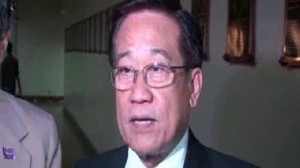Waiver by Supreme Court bets ‘unconstitutional’—lawyer
The decision of the Judicial and Bar Council (JBC) to require all aspirants for the post of Chief Justice to waive the confidentiality of their bank accounts is unconstitutional because it imposes something not found in the Constitution, a lawyer said Tuesday.
Romulo Macalintal said the waiver requirement was also discriminatory since it had not been required of the applicants for positions in the lower courts.
Section 7(1), Article VIII of the 1987 Constitution provides that appointees to the Supreme Court must be natural-born Filipino citizens, at least 40 years old and with at least 15 years of law practice, Macalintal said.
“The JBC cannot prescribe what the Constitution does not provide. To impose the requirement upon the aspirants for Chief Justice is to broaden the qualification provided for by the Constitution. In other words, the JBC waiver requirement is invalid since it is clearly in conflict with the requirements in the Constitution,” he said in a statement sent from the United States.
The JBC’s announcement of the vacancy for the position of Chief Justice is set to be published today. An advance copy sent to the media stated that all applications and recommendations must be submitted by July 6.
Article continues after this advertisementAside from the waivers, candidates for Chief Justice are also asked to submit all their previous statements of assets, liabilities and net worth up to Dec. 31, 2011.
Article continues after this advertisementMacalintal said the waiver requirement was similar to Section 36 of Republic Act No. 9165, or the Comprehensive Dangerous Drugs Act of 2002, which required the mandatory drug testing of candidates for public office.
The provision was declared unconstitutional by the Supreme Court on Nov. 3, 2008, because it “enlarges the qualification requirements enumerated in the Constitution and that the Commission on Elections cannot impose qualifications on candidates in addition to what the Constitution prescribes,” Macalintal said, citing the high court’s decision.
“The waiver requirement may be allowed only if it is optional or voluntary to the applicants but never to make it mandatory to the applicants which ‘necessarily suggests that the obstinate ones shall suffer the adverse consequences for not adhering to the requirement’ as observed by the Supreme Court in the drug test case,” he added.
Macalintal said the waiver requirement was also discriminatory to the applicants for the post of Chief Justice since the waiver had not been required of other positions in the judiciary and all other applicants in government service as well as candidates for elective positions.
“As a matter of fact, even statements of assets, liabilities and net worth are not required from these applicants when they are still applying for positions in the government service,” he said.
Senate President Juan Ponce Enrile also opposed the JBC requirement, saying that it was “OA (overacting)” and that it was like telling the nominee that he was not trustworthy so he needed to sign the waiver.
Enrile added that he would not agree to such a condition if he were the nominee, saying, “I will be serving the country and immediately you suspect my motives.”
Waiver defended
A member of the JBC, Ma. Milagros Fernan-Cayosa, who represents the Integrated Bar of the Philippines, defended the waiver requirement.
“We deemed it (the submission of the waiver) necessary in the course of our discussion (on Monday) because we do not want a repeat of what happened. So those who are aspiring to become the next Chief Justice must be willing to open themselves up for us to be able to make a better determination of the fitness of the applicant,” Cayosa said in a radio interview.
She pointed out that the waiver was not general but only in favor of the JBC.
Cayosa said candidates, who have pending criminal or administrative cases, including a disbarment case, would be disqualified from being nominated.
If the disbarment and other cases involving aspirants are not resolved before the JBC comes up with its final short list, then the aspirants will be automatically disqualified, she added.
Under Rule 4, Section 5 of the JBC Rules, aspirants with pending criminal or regular administrative cases are disqualified from being nominated for appointment to any judicial post or as Ombudsman or Deputy Ombudsman.
Also disqualified are those with pending criminal cases in foreign courts or tribunals, and those who have been convicted in any criminal or administrative case, where the penalty is at least a fine of more than P10,000, unless he has been granted judicial clemency.
Judges, officials or personnel of the judiciary who are facing administrative complaints under informal preliminary investigation by the Office of the Court Administrator may likewise be disqualified from being nominated if it is determined that the charges are serious.
Originally posted: 3:19 pm | Tuesday, June 5th, 2012
